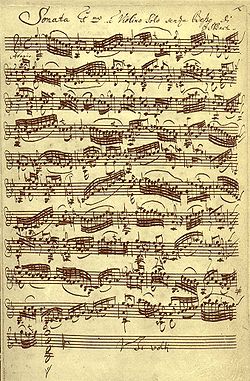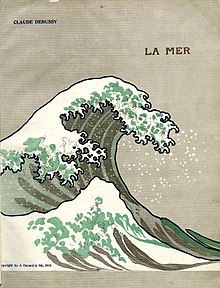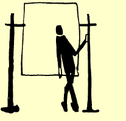Here's the Spotify playlist: Renewable Music Landmarks (94 tracks, total time: 13 hours) I will add in more stuff as Mr. Wolf continues this series.
Friday, September 24, 2010
Renewable Music Landmarks
I've been following Germany-based American composer Daniel Wolf's enlightening blog Renewable Music for some time now, and I got to know many hidden masterworks, from medieval to contemporary classical, through his "Landmarks" series. I compiled a Spotify playlist after this series. For the compostions that are not yet available on Spotify, I replaced them with other works of the composer that Mr. Wolf mentioned when possible. I strongly recommend you to read the articles as well as listening to these music, so I linked every title to the corresponding blog post below:
Here's the Spotify playlist: Renewable Music Landmarks (94 tracks, total time: 13 hours) I will add in more stuff as Mr. Wolf continues this series.
Here's the Spotify playlist: Renewable Music Landmarks (94 tracks, total time: 13 hours) I will add in more stuff as Mr. Wolf continues this series.
Sunday, September 19, 2010
37 Ways to Play the Sonatas and Partitas for Solo Violin
Naturally, after the WTC playlist, I compiled another one for the supreme masterwork for the queen of all instruments: Bach's Sonatas and Partitas for Solo Violin. So far I found 37 recordings by 32 artists, from Schumann and Brahms' lifelong friend Joseph Joachim, who made the Bach recording in 1903, to the talented young Dutch violinist Janine Jansen, who was born 147 years later than Joachim. Just like the WTC playlist, this one can also function as an index of great violinists on Spotify. Only significant missings seem to be Joseph Szigeti and Adolf Busch.
I put the opening movement of the first sonata, the adagio from every recording to this playlist, you can compare the first notes of every recording at ease, or, much better than that, simply brower the artist names and pick up one recording for two hours of sublime music.
Here's the Spotify playlist: Bach: Sonatas & Partitas for Solo Violin (37 tracks, total time: 2 hours) You can find some useful notes and reviews here. My favourite recordings for now are Grumiaux, Mintz, Milstein and Szeryng's.
I put the opening movement of the first sonata, the adagio from every recording to this playlist, you can compare the first notes of every recording at ease, or, much better than that, simply brower the artist names and pick up one recording for two hours of sublime music.
Here's the Spotify playlist: Bach: Sonatas & Partitas for Solo Violin (37 tracks, total time: 2 hours) You can find some useful notes and reviews here. My favourite recordings for now are Grumiaux, Mintz, Milstein and Szeryng's.
Tuesday, September 14, 2010
30 Ways to Play the Well-Tempered Clavier
Today's post is about a 30-track playlist of music's most fascinating and intriguing work, The Well-Tempered Clavier composed by Johann Sebastian Bach. I chose 30 different recordings of this work made by 30 distinctive artists, and put every C Major prelude BWV 846 in this playlist. The result is great fun, you can listen to 30 different interpretations of this profoundly charming prelude in a row, or simple browse the artist names and pick up one complete recording of the WTC and listen to the full album.
Most of my favourite recordings are on Spotify now, Edwin Fischer, Glenn Gould, András Schiff, Till Fellner, Sviatoslav Richter, and Rosalyn Tureck. And in the progress of compiling this playlsit I found a truly great recording that was unknown to me, the complete WTC by Australian pianist Roger Woodward, here's a very informative blog post about him. Another stimulating recording is from Olli Mustonen, who mixed the Old Testament of piano literature with Shostakovich's 24 Prelude and Fugue Op. 87. The only important missing recordings of WTC I can think of are Pierre Hantai, Kenneth Gilbert and Angela Hewitt's. I hope Spotify makes a deal with Hyperion soon.
Here's the Spotify playlist: Well-Tempered Clavier (30 tracks, total time: to infinity and beyond). You can find lots of helpful reviews on these recordings here. And this video below clearly demonstrates the importance of interpreters in Bach's music:)
Most of my favourite recordings are on Spotify now, Edwin Fischer, Glenn Gould, András Schiff, Till Fellner, Sviatoslav Richter, and Rosalyn Tureck. And in the progress of compiling this playlsit I found a truly great recording that was unknown to me, the complete WTC by Australian pianist Roger Woodward, here's a very informative blog post about him. Another stimulating recording is from Olli Mustonen, who mixed the Old Testament of piano literature with Shostakovich's 24 Prelude and Fugue Op. 87. The only important missing recordings of WTC I can think of are Pierre Hantai, Kenneth Gilbert and Angela Hewitt's. I hope Spotify makes a deal with Hyperion soon.
Here's the Spotify playlist: Well-Tempered Clavier (30 tracks, total time: to infinity and beyond). You can find lots of helpful reviews on these recordings here. And this video below clearly demonstrates the importance of interpreters in Bach's music:)
Sunday, September 12, 2010
Debussy, Mahler, and Scriabin Played By Themselves
Spotify just added some of the most important piano roll recordings from Pierian Recording Society, including the complete known piano rolls of Debussy, Ravel, and Scriabin. You can find some raving reviews for the Debussy disk here, and detailed informations for the Scriabin and Ravel recording.
Also from this amazing series: piano rolls of Lizst's students plays Liszt, Respighi plays Fountains of Rome, and Granados plays his own works. Recordings from other label in this playlist: a Mahler piano roll recording realised with Mahler's own piano, and Shostakovich plays his piano works, including a piano duet arrangement of his Symphony No.10, recorded in 1954.
Here's the Spotify playlist: Composer as Pianist (144 tracks, 10 hours)
Also from this amazing series: piano rolls of Lizst's students plays Liszt, Respighi plays Fountains of Rome, and Granados plays his own works. Recordings from other label in this playlist: a Mahler piano roll recording realised with Mahler's own piano, and Shostakovich plays his piano works, including a piano duet arrangement of his Symphony No.10, recorded in 1954.
Here's the Spotify playlist: Composer as Pianist (144 tracks, 10 hours)
Thursday, September 9, 2010
Classical Music Inspired By The Sea
For this playlist I only selected music that actually depicts the sea, waves or a voyage, so no tone poems about Nereid or Neptune, nor operas like Riders To The Sea, but Wagner's overture to The Flying Dutchman fits in nicely. Here are some of the hightlights in this plyalist: Debussy's La mer and the Sirens movement from his Nocturnes, Ravel's Une barque sur l'océan (A Boat On The Ocean), Britten's Four Sea Interludes, Frank Bridge's Sea Suite, Delius' Sea Drift, Hugo Alfvén's symphony no.4 "From the Outermost Skerries", Takemitsu's Toward the Sea, Sibelius' The Oceanides, Bax's The Garden of Fand, and, don't yell you purists;) the dolphins are dancing, Herbie Hancock's most beautiful album Maiden Voyage. Over two dozens more composers are covered, and looking forward to your suggestions.
Here's the Spotify playlist: The Sea (141 tracks, 16 hours), enjoy the voyage.
Here's the Spotify playlist: The Sea (141 tracks, 16 hours), enjoy the voyage.
Wednesday, September 8, 2010
The Greatest 20th Century String Quartet Composer?
I'm still in the progress of making a 20th century string quartets playlist, on a one-quartet-per-composer basis. But I feel that I have to make a separate playlist for Heitor Villa-Lobos. This Amazon review summed it up really well:
"Few people know Villa-Lobos wrote more string quartets (17 as far as I know from this label) than Shostakovich, works with the comparable originality and intensity. His earlier quartets are heavily influenced by Faure and Ravel, but already have his own voice, very uniquely southern-hemispherenisque and with sublimely lyrical slow movements.
Later the works, the more original and more personal just like Shostakovich. But nature of the music is completely different. In his music you hear birds and animals in a way no other composers on our side of the planet could express. Some works have extraordinary organic complexity which sounds almost too daring.
Danubius Qt plays like any top class ensemble in the world, with vivid imagination and warm & firmly centered tone. Actually they play far better than those famous quartets with major classical labels. I wish Malco Polo keeps these amazing 6 volumes permanently in cataloge."
Here's the Spotify playlist: Villa-Lobos String Quartets (70 tracks, total time: 6 hours) Check out here for detailed information on every quartet.
"Few people know Villa-Lobos wrote more string quartets (17 as far as I know from this label) than Shostakovich, works with the comparable originality and intensity. His earlier quartets are heavily influenced by Faure and Ravel, but already have his own voice, very uniquely southern-hemispherenisque and with sublimely lyrical slow movements.
Later the works, the more original and more personal just like Shostakovich. But nature of the music is completely different. In his music you hear birds and animals in a way no other composers on our side of the planet could express. Some works have extraordinary organic complexity which sounds almost too daring.
Danubius Qt plays like any top class ensemble in the world, with vivid imagination and warm & firmly centered tone. Actually they play far better than those famous quartets with major classical labels. I wish Malco Polo keeps these amazing 6 volumes permanently in cataloge."
Here's the Spotify playlist: Villa-Lobos String Quartets (70 tracks, total time: 6 hours) Check out here for detailed information on every quartet.
Friday, September 3, 2010
Spotify Variations On The Theme Of 4'33"
Another Alex Ross copycat playlist, this time inspired by his new blog post: 4'33" Playlist. To celebrate John Cage's 98th birthday this Sunday, I composed my own variations on the theme of 4'33". See the manuscript below, and use I Ching to determine the play order.
(click to enlarge)
Here's the Spotify playlist: 4'33" (23 tracks, total time: 4'33"*23)Thursday, September 2, 2010
Chacona, Lamento, Walking Blues: A Spotify Playlist
Alex Ross just published an audio guide for the second chapter of his new book Listen to This on his blog, but now the post is gone (though you can still find the tracklist here). If you haven't read it yet, subscribe to The Rest Is Noise in Google Reader or other RSS readers, and you should be able to find it. I quote the first paragraph below so you can get an idea of what this playlist is about:
"In "Chacona, Lamento, Walking Blues," the second chapter of my new book Listen to This, I tell of a story of pattern recognition—simple repeating figures that can be found in the music of many centuries and many genres. While I don't believe in the idea of music as a "universal language"—try telling that to a tired mom who is being forced to listen to her teenager's hip-hop, or, for that matter, the teenager who has to sit through his grandmother's Mozart records—there is, in fact, much common ground in the world's musical cultures, strands of DNA that appear everywhere. I'll focus on two such figures: a dance form called the chaconne and a pair of bass lines associated with lament. We'll go from Renaissance madrigals to Led Zeppelin, by way of Monteverdi, Purcell, and Bach, whose great Chaconne for solo violin is at the heart of the chapter. It's a story both of radical transformation and of surprising continuity."
Here's the Spotify playlist for all the music that was mentioned in this chapter: Alex Ross' Listen To This: Chapter 2 (27 tracks, total time: 2 hours) And by chance I revisited the playlist for The Rest Is Noise yesterday, here's the post, and the playlist: Alex Ross' 20th Century Limited.
I will make Spotify playlists for other chapters as well. Thanks to the new playlist folders feature, it's easy to put all the Alex Ross playlists in one place. Looking forward to getting the book soon.
"In "Chacona, Lamento, Walking Blues," the second chapter of my new book Listen to This, I tell of a story of pattern recognition—simple repeating figures that can be found in the music of many centuries and many genres. While I don't believe in the idea of music as a "universal language"—try telling that to a tired mom who is being forced to listen to her teenager's hip-hop, or, for that matter, the teenager who has to sit through his grandmother's Mozart records—there is, in fact, much common ground in the world's musical cultures, strands of DNA that appear everywhere. I'll focus on two such figures: a dance form called the chaconne and a pair of bass lines associated with lament. We'll go from Renaissance madrigals to Led Zeppelin, by way of Monteverdi, Purcell, and Bach, whose great Chaconne for solo violin is at the heart of the chapter. It's a story both of radical transformation and of surprising continuity."
Here's the Spotify playlist for all the music that was mentioned in this chapter: Alex Ross' Listen To This: Chapter 2 (27 tracks, total time: 2 hours) And by chance I revisited the playlist for The Rest Is Noise yesterday, here's the post, and the playlist: Alex Ross' 20th Century Limited.
I will make Spotify playlists for other chapters as well. Thanks to the new playlist folders feature, it's easy to put all the Alex Ross playlists in one place. Looking forward to getting the book soon.
Wednesday, September 1, 2010
Complete Karajan Gold On Spotify
Intro from DG's official site: "The compact disc, as a medium for sound, was still on the horizon when Herbert von Karajan urged his record company to utilize the new digital technology for his recordings. Consequently Karajan's Magic Flute, recorded in 1980, became the first release of a Deutsche Grammophon digital production and was first released on LP.
By the time the maestro died in 1989, the CD had replaced the LP as the primary medium for sound, yet he was realistic enough to know that the pioneering early stages of the digital era would be followed by further technical development. This is reflected in Karajan Gold.
In this series, refinements of the digital process occurring after Karajan's death were applied to enhance the Maestro's own recordings. Thirty releases from the early digital era were remastered for this series using DG's special Original-Image Bit-Processing technology. They were originally issued between 1993-1995."
It's all too easy, and it was quite fashionable to bash Karajan's conducting, but this man was really good at what he's doing. His late romantic recordings are usually safe first choices, and his 4th Beethoven cycle included here has a beauty of its own. Indeed the first cycle from the 60's is still preferred, but why not try them all when you've got Spotify?;) Click here for the full list of albums and details in this series.
Here's the Spotify playlist: DG: Karajan Gold (272 tracks, total time: 1 day) I put his last recording, a deeply spiritual Bruckner 7th with VPO at the end. Press Ctrl(Command on Macs) + G in Spotify for album view to browse this wonderful collection.
By the time the maestro died in 1989, the CD had replaced the LP as the primary medium for sound, yet he was realistic enough to know that the pioneering early stages of the digital era would be followed by further technical development. This is reflected in Karajan Gold.
In this series, refinements of the digital process occurring after Karajan's death were applied to enhance the Maestro's own recordings. Thirty releases from the early digital era were remastered for this series using DG's special Original-Image Bit-Processing technology. They were originally issued between 1993-1995."
It's all too easy, and it was quite fashionable to bash Karajan's conducting, but this man was really good at what he's doing. His late romantic recordings are usually safe first choices, and his 4th Beethoven cycle included here has a beauty of its own. Indeed the first cycle from the 60's is still preferred, but why not try them all when you've got Spotify?;) Click here for the full list of albums and details in this series.
Here's the Spotify playlist: DG: Karajan Gold (272 tracks, total time: 1 day) I put his last recording, a deeply spiritual Bruckner 7th with VPO at the end. Press Ctrl(Command on Macs) + G in Spotify for album view to browse this wonderful collection.
Subscribe to:
Posts (Atom)











